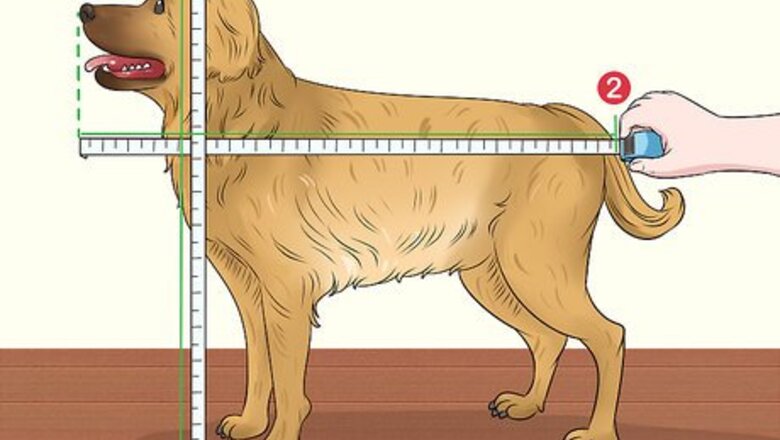
views
Planning Your Dog Crate
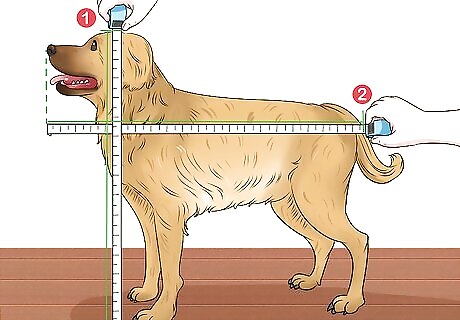
Measure your dog. To start concretely planning the dimensions of your crate, you’ll need to accommodate your dog’s size. Measure your dog’s height (from its feet to the top of its head) and length (nose tip to the tip of its tail).
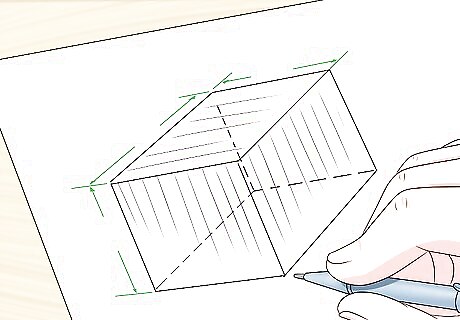
Decide on the dimensions of your crate. Once you’ve measured how big your dog is, you’ll need to plan the size of your crate accordingly. Your dog will need enough room to stand, sit, and turn around in this crate. You’ll want to give your dog room to move side-to-side, so avoid making the crate too narrow. For example, if your dog measures 3 feet from the tip of its nose to the tip of its tail, and 1 foot high, consider planning for a crate that is 4 feet long, 2 feet high, and 3.5 feet (1.1 m) wide. Some dog owners may be looking for a relatively small dog crate, in which their dog can sleep. Smaller crates can also be used to contain your dog when guests are over, or if you need to be out of the house for several hours at a time. On the other hand, dog owners may want a larger crate—or even a primarily outdoor crate—that can house the dog for longer periods of time. A large crate can also serve as a place for the dog to sleep. If you have the time, you could also visit nearby pet supply stores and look at the manufactured crates that the store offers. This will give you an idea of common crate sizes, and you can see which would work best for your own dog
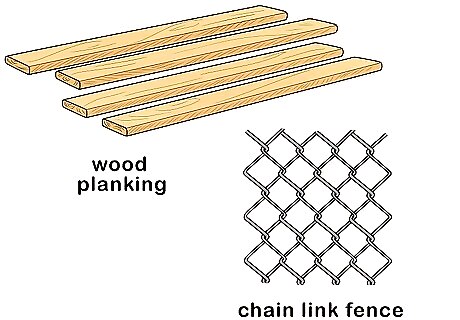
Choose the best material for your purposes. Most homemade crates are built either out of wood planking or chain link fence, since both of those materials are fairly cheap and can be found at local hardware stores. Both types of crates can be moved, but if you want a crate that you can relocate throughout your house, a wooden crate will better meet this need. Consider building your crate out of wood if you’d like for it to be located indoors, and if your dog will not be spending large amounts of time (over 8 hours) in the crate. You should not leave a dog unattended in an indoor crate for longer than 8 hours at a time. It can be unhealthy for the animal to go longer without access to food, water, and a place to go to the bathroom. Consider building your crate from chain link if you plan to keep it outdoors, and if your dog will be spending more substantial amounts of time in the crate. If your dog will be in the crate for over 8 hours, provide it with food and water. Although it is not technically a crate, some dog owners build their animals large outdoor enclosures—for example, 150 square feet—to give the animal plenty of space to move and use the bathroom.
Building a Wooden Dog Crate
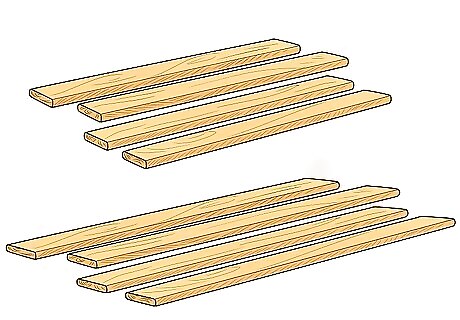
Buy your wooden planking. You will be making a wooden crate, so pick out what kind of wood you’d like to use. The simplest way to build a wooden crate is to have wooden planking on the top, bottom, and sides, with a door that allows for ventilation attached to the front. Pine is very common when it comes to animal crates—it’s a sturdy, common, and cheap wood. You will also need to purchase a tape measurer, nails and hinges, and a hammer. Unless you already have a door for the dog cage, or plan to build your own, you can buy a gridded metal cage door, which you can attach to the side of the crate. All of these materials should be available at a local hardware store.
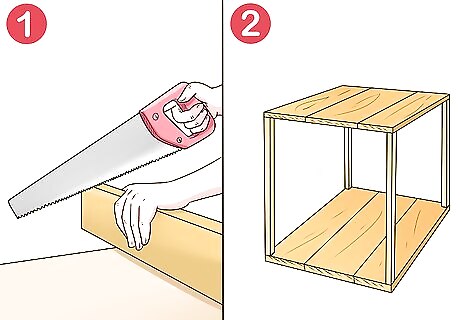
Make the top and bottom sections of your crate. Using a table saw, a circular saw, or a hand saw, cut the pieces of wood to the exact measurements that you decided upon earlier. Since the top and bottom of the crate will be the same size, you can mark both with the same measurements. When you measure the planking before making the cuts, trace a pencil along the lines where you need to cut. This will help you guide the saw while you are cutting and will ensure that your cut pieces of wood are the correct size.
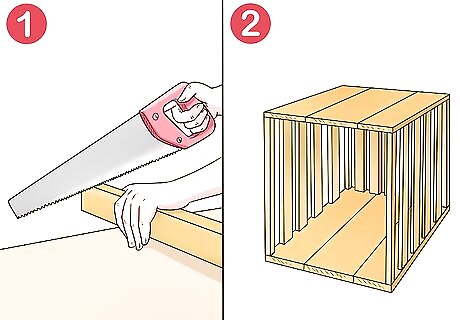
Make the sides and back. Cut out pieces of wood to the desired dimensions for the sides and back of the crate. As with the top and bottom, mark the dimensions on the planking before you cut the wood. Measure and cut two pieces that are the planned size for the two sides of the crate, and stand these pieces on their sides next to the bottom of the crate. Then, repeat the procedure, but with the dimensions planned for the back of the crate. Stand the three wooden side-pieces (two sides and the back) next to the base-piece of the crate. Align the pieces, and then nail the sides and back into the bottom plank. Put your top piece on top of the crate’s sides. Make sure that the edges of the top align with the sides, and then nail the top in place.
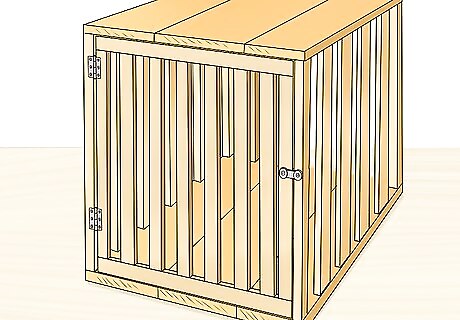
Attach the door to one of the crate’s sides. If you’re using a gridded metal door that you’ve purchased, it should already have hinges attached. Mount the loose ends of the hinges on the dog’s crate, using the method suggested by the door manufacturer. Finally, attach a latch to the other side of the door so that it can close properly. You may be able to attach the hinges to the side of the crate using gorilla glue or another extreme adhesive. If you must use screws or nails to attach the hinges, make sure to file down the screw or nail tips on the inside of the cage, so they do not stab your dog. If you don’t have a file, use your hammer to bend the tips of the screws or nails so that they are parallel to the wood planking and can’t scratch your dog. Make sure that the door can open freely.
Building a Chain Link Dog Crate
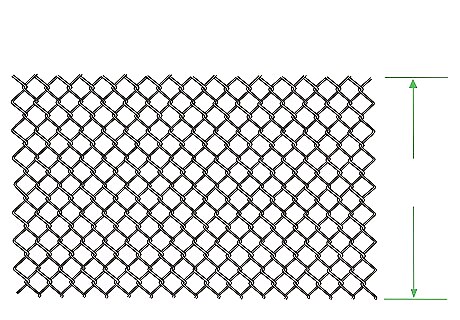
Choose and purchase your fencing materials. Chain link-fence will be the easiest and most convenient to use. You can select the height and length of fence you’d like to purchase—buy enough to match the size dimensions that you’ve decided on for the crate. You should be able to purchase readymade wall and door sections at your local hardware or home-center store; this will be easier to assemble than fencing material from a spool. Plan for the fencing to be at least 4 feet high, so that your dog will not leap out of the crate. You can also purchase a readymade top to affix to the top of the crate—this should guarantee that the dog will not escape.
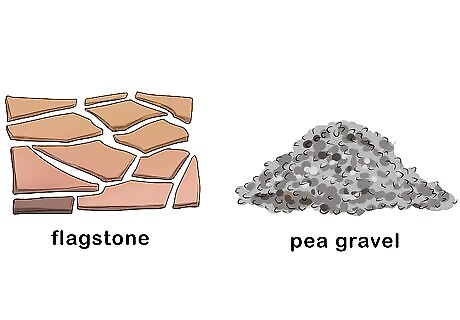
Decide on the flooring material. Assuming that this dog crate will be installed outside, flagstone and pea gravel are popular options. Choose which you would like to use, and purchase the material at a hardware or gardening supply store. If you decide to bring a chain-link dog crate inside, you could affix the bottom of the fencing material to a large piece of plywood that has been cut to the dimensions of the crate.
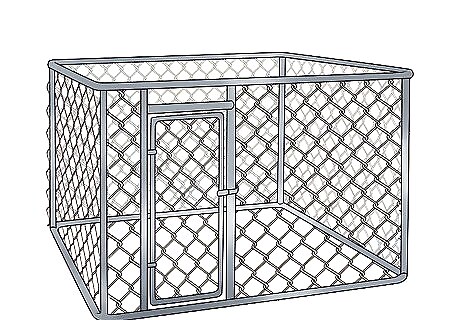
Assemble the crate. Depending on the type and amount of fencing material you purchased, you’ll need to assemble the premade wall and door segments as directed by the manufacturer. Locate the crate in your backyard or other outdoor area near to your house. If you choose to locate the crate inside your house, set it on a surface—such as concrete or cement—that will not be damaged by the steel wires. Chain-link crates are typically installed outside. Consequently, in order to prevent dogs from digging out under the chain link, you may need to dig down and bury the bottom edge of the crate fence about a foot deep.
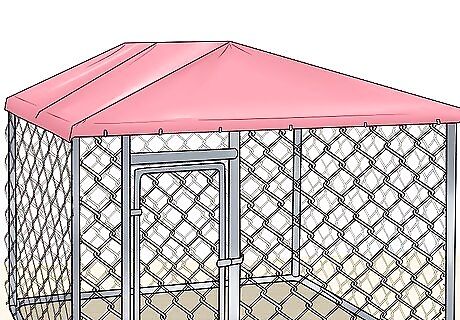
Consider adding shade or insulation. If the dog is going to be spending substantial amounts of time in its crate outside—especially if you live in a region with extreme high or low temperatures—you may want to install some material to protect your dog from the sun or inclement weather. Even setting plywood up against the edges of the crate will keep wind from coming in, and placing a couple sheets of plywood on the top of the crate will prevent sun and rain from hitting the dog. If you’ve got a dog that chews, you may want to insulate the crate with a durable and safe material.




















Comments
0 comment